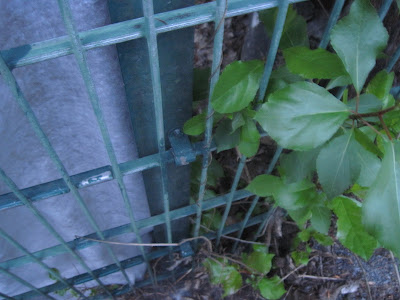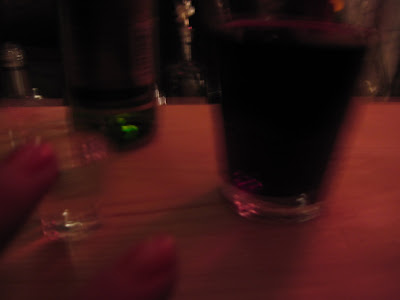Tuesday, 15 June 2010
The Whiff of Sulphur in the Air
Tuesday, 18 May 2010
2nd Prize Karlspreis fuer die Jugen


So yes, surprise of all surprises occured a week ago in Aachen. BDP got 2nd prize in the huge Karlspreis for Youth. They recognised the quality of our content, our ambition to question the borders of not only 'Europe' but also what young artists and writers and activists can get away with regarding preconceptions toward them and their work. Free of any big organisation - unlike many of the other projects - our work was independent and yet sure of itself.
Monday, 17 May 2010
Rue Danielle Casanova
 When I first went to rue Danielle Casanova I was homeless. But life was good and the swing of things went from very bad to very good via New York and back again. In the middle of listing all the places I'm sleeping this year, I think Danielle Casanova will remain hard to beat in terms of connotations, memoriesm setting. I think that's why I put it in The Readymades so much: I wanted to write about it the only way I could. Anyway, doing some half baked research I came across the above text. It's wonderful that Picabia - of all people! - lived just down the road, in I think the same building I went many a morning to buy tobacco. It was Picabia's work that started off my writing in my first story, Germania. He is, of course, big inspiration for Djordje Bojic and other LGB artists.
When I first went to rue Danielle Casanova I was homeless. But life was good and the swing of things went from very bad to very good via New York and back again. In the middle of listing all the places I'm sleeping this year, I think Danielle Casanova will remain hard to beat in terms of connotations, memoriesm setting. I think that's why I put it in The Readymades so much: I wanted to write about it the only way I could. Anyway, doing some half baked research I came across the above text. It's wonderful that Picabia - of all people! - lived just down the road, in I think the same building I went many a morning to buy tobacco. It was Picabia's work that started off my writing in my first story, Germania. He is, of course, big inspiration for Djordje Bojic and other LGB artists.Sunday, 9 May 2010
Thursday, 6 May 2010
Sunday, 2 May 2010
Cover Design - What's the Opposite of Covers Dictated by Marketing Departments?
Wednesday, 14 April 2010
Tuesday, 6 April 2010
Reading
Monday, 5 April 2010
We say goodbye to each other at Bornholmerstrasse, we say goodbye to ourselves on the road home in loud, or first road, the road of our first darkness; we lose ourselves on it as moon alone lights stones endless and ourselves are waved goodbye to, we become one with a world beyond islands -
We grow -
We say goodbye to each other on the quay of Pankstrasse unterbahnhof and once again a train carries us away, like at Ostkruez or Gare du Nord or Oslo sentralstasjon, we go on, we carry on, with precision and ease -
We leave each other with tears and peristalsis going wrong, at Zentral Omnibus station, airports, doorways to new homes. We walk alone and go forth and each time we think we’re joining a party that’s been arranged for us singly when really it is just a waiting group, a waiting room, in caravan, that more or less or great and worse is not for one but noone and we go on - we carry on -
Regardless -
Thursday, 11 March 2010
Charlemagne Prize
Irish winner who will compete for European Youth Prize announced
'You are here', a book project including contributions from 14 young people across Europe, was today announced as the Irish winner which will go forward to compete for the Charlemagne European Youth Prize in Aachen in Germany on 11 May. The project, which was submitted by John Holten from Ardee, Co. Louth, brought together young people born after 1980, 'who enjoy freedom of movement in Europe and work in a country they did not grow up in.' These young people have also grown up without the shadow of the Berlin Wall. Mr Holten said that the project had succeeded in creating 'greater European awareness among [the] group, including people who would normally not get a chance to meet each other or publish their work together.'
Irish MEPs Gay Mitchell (Fine Gael) and Nessa Childers (Labour Party) were members of the Irish jury, along with Jean-Marie Cullen of the National Youth Council of Ireland (NYCI). Ms Childers said that she was 'delighted to be involved in a competition which encourages young people to take an active interest in EU issues.' Commenting on the point of departure chosen by the winning project, Mr Mitchell stated that 'to understand Berlin is to understand the European Union project.' Ms Cullen said that 'the NYCI welcomes this initiative which rewards young people's creativity.'
The 'You are here' project, represented by Mr Holten will now join the winning project from each of the other 26 EU Member States at the award ceremony for the Charlemagne European Youth Prize in Aachen in Germany on 11 May 2010. At the ceremony, overall winners will be chosen, and they will receive funding of between €2,000 and €5,000.
The Charlemagne European Youth Prize is organised on an annual basis by the European Parliament and the International Charlemagne Prize based in Aachen. Francis Jacobs, Head of the European Parliament Office in Ireland, commented on the range of projects submitted in Ireland this year. He said that the 'variety of the projects was impressive' and spoke of the fact that 'they bring together young people across Europe, in order to exchange experiences and learn from each other.'
In 2009, a Polish youth project 'YOUrope Needs You' was the overall winner of the Charlemagne Youth Prize. Through a series of secondary school workshops run by university students, this project conveyed interesting facts about Europe to teenagers. The second and third prize went to projects from France and Germany respectively.
Wednesday, 10 March 2010
Thursday, 25 February 2010
Tuesday, 9 February 2010
Best European Fiction 2010 - Dalkey Archive Press
Best European Fiction 2010, Aleksandar Hemon, ed., Dalkey Archive Press, 2010
It has been said before, and often, that anthologies are difficult and prone to error, and even if they do their job right they can still leave their readers dissatisfied, yearning for more. Anthologising Europe, in any shape or form, is always a formidable challenge. Dalkey Archive Press have initiated a timely and ambitious effort to try and collect the continent’s best fiction, edited by Bosnian writer Aleksandar Hemon, translate it and present it to an international, mainly American readership.
Friday, 5 February 2010
This Exhibition is Not the Result of a Thesis, Bit It's Starting Point...
 This qoute came from the exhibition catalogue of The Death of The Audience in Vienna's Secession which Line was lucky enough to see last summer. And the on-going 'transgressions' of the thesis in question is under discussion in the latest issue of the e-flux journal, no. 13.
This qoute came from the exhibition catalogue of The Death of The Audience in Vienna's Secession which Line was lucky enough to see last summer. And the on-going 'transgressions' of the thesis in question is under discussion in the latest issue of the e-flux journal, no. 13. Take Djordje Bojić [André du Colombier] for instance, a Serbian [French] artist who is even less well-known than those named above, an incredible character who embodied a kind of late version of Dada from the '90s and early 2000s [‘60s to the ‘80s], but with a very precise and concentrated radicality. He constantly worked with common people, less showing work than giving it, a bit like a neighborhood poet, exchanging a piece of work for a pack of cigarettes, generally using the thread of the rumor, the web of the conversation. He used to call up artists or museum curators and make a work from the conversation. Bojić [Colombier] managed to represent a way of being marginal, of staying on the border of exhibitions even while being well-known by the whole art scene...
.... Of course it’s a bit too easy to hide behind the domination and exploitation of artists in authoritarian events such as biennials, but at the same time we can clearly see that the figure of the artist-hero is no longer current, but is rather a historicist view that tries to cling to the branches of the avant-garde. Similarly, in the context of the over-institutionalized Tate Triennial, “Altermodern” works like a parody of the work of the great critics of the twentieth century, up to Pierre Restany or Germano Celant, trying to create a movement. It’s still about trying to create a party, a power position, an adhesion, contrary even to how artists themselves work. Rather than oversimplify the role of the artist, it might make more sense to look outside this figure to a form of organization to be presented or prolonged, one in which the community is involved, where not only the artist but the audience provides a disseminated, deterritorialized experience for the exhibition.
- Pierre Pal-Blanc





















